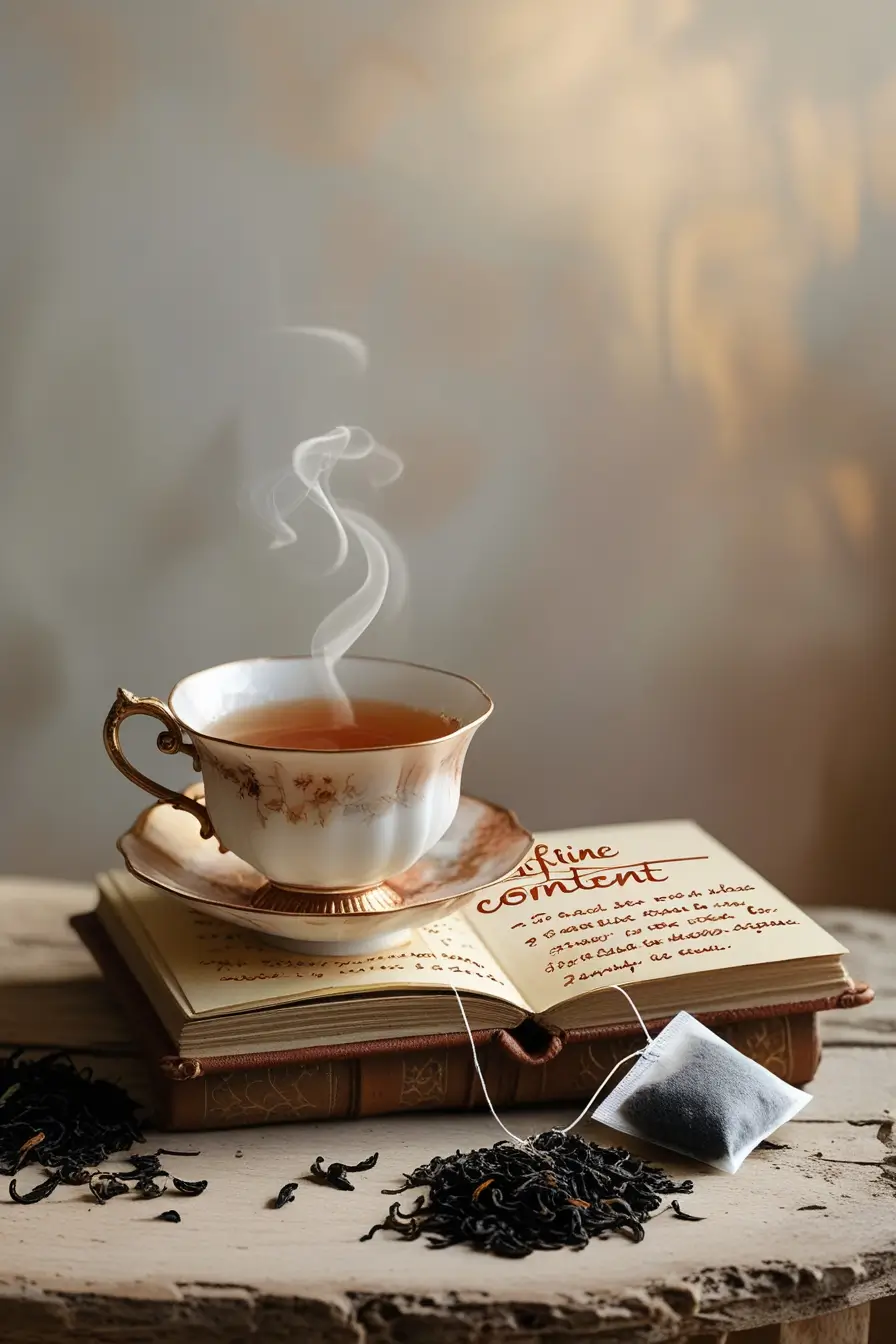How Much Caffeine in Black Tea For Your Daily Cup?

Black tea is a beloved beverage enjoyed by millions worldwide, and understanding its caffeine content is crucial for those monitoring their daily intake. A typical cup of black tea contains between 14-70 mg of caffeine, with an average of 47 mg per 8-ounce serving. However, several factors influence the exact amount, making it essential to understand the variables that affect your daily caffeine consumption.
The Science Behind Black Tea’s Caffeine Content
Black tea leaves naturally contain caffeine, which is released during the brewing process. The caffeine content varies significantly based on several key factors:
Brewing Time and Temperature
The longer you steep your tea and the hotter the water, the more caffeine is extracted from the leaves. A typical 3-5 minute steep in water at 200°F (93°C) provides optimal caffeine extraction while maintaining pleasant flavor notes.
Tea Variety and Grade
Different types of black tea contain varying amounts of caffeine:
– Assam: 50-90 mg per cup
– Ceylon: 40-60 mg per cup
– English Breakfast: 40-70 mg per cup
– Darjeeling: 30-50 mg per cup
Leaf Size and Processing
Smaller tea particles, such as those found in tea bags, release caffeine more quickly than whole loose leaves. This is why tea bags often produce a stronger, more caffeinated brew in less time compared to loose-leaf varieties.
Comparing Black Tea Caffeine to Other Beverages
To put black tea’s caffeine content in perspective, let’s compare it to other popular beverages:
– Coffee (8 oz): 95-200 mg
– Black Tea (8 oz): 14-70 mg
– Green Tea (8 oz): 12-45 mg
– Oolong Tea (8 oz): 12-55 mg
– White Tea (8 oz): 6-25 mg
– Cola (12 oz): 35-45 mg
Factors Affecting Caffeine Extraction in Black Tea
Understanding how to control the caffeine content in your black tea empowers you to make informed decisions about your consumption. Several key factors influence caffeine extraction:
Water Temperature Impact
Using water that’s too cool (below 180°F) results in incomplete caffeine extraction while boiling water maximizes caffeine release. Use water between 200-212°F (93-100°C) for optimal results.
Steeping Duration Effects
The relationship between steeping time and caffeine content is direct:
– 1 minute: 20-30% caffeine extraction
– 3 minutes: 50-70% caffeine extraction
– 5 minutes: 75-90% caffeine extraction
– Over 5 minutes: Maximum caffeine extraction, but may result in a bitter taste
Health Considerations and Caffeine Content
When considering how much caffeine in black tea affects your health, several factors come into play:
Daily Recommended Limits
The FDA suggests that healthy adults can safely consume up to 400 mg of caffeine daily. Given black tea’s moderate caffeine content, most people can enjoy several cups without exceeding this limit.
Benefits of Black Tea’s Caffeine
Black tea provides a more gradual and sustained energy boost than coffee, thanks to L-theanine, which moderates caffeine’s effects. This combination often results in:
– Improved focus without jitters
– Sustained mental alertness
– Better stress management
– Enhanced cognitive performance
Tips for Managing Black Tea Caffeine Intake
To optimize your black tea consumption and caffeine intake, consider these practical suggestions:
Time of Day Considerations
– Morning: Enjoy stronger brews with maximum caffeine
– Afternoon: Moderate steeping time for balanced energy
– Evening: Shorter steeping times or decaf alternatives
Brewing Methods for Caffeine Control
1. Cold Brew Method
– Results in lower caffeine content
– Produces a smoother, less bitter taste
– Requires 8-12 hours of preparation time
2. Traditional Hot Brewing
– Offers full caffeine extraction
– Provides traditional flavor profile
– Takes just 3-5 minutes
Decaffeination Processes and Their Impact
Understanding decaffeination methods helps explain residual caffeine content in decaf black tea:
Commercial Decaffeination Methods
– CO2 Process: Removes 96-98% of caffeine
– Ethyl Acetate: Removes 94-96% of caffeine
– Water Processing: Removes 93-95% of caffeine
Home Decaffeination Technique
While not as effective as commercial methods, you can reduce caffeine content at home:
1. Steep tea for 30 seconds
2. Discard the water
3. Re-steep with fresh hot water
This method removes about 20-30% of the caffeine content.
Special Considerations for Different Groups
Understanding how much caffeine in black tea affects different populations is crucial for safe consumption:
Pregnant Women
– Limit daily caffeine intake to 200 mg
– Monitor tea strength and serving size
– Consider switching to decaf alternatives
Seniors
– May be more sensitive to caffeine
– Should monitor blood pressure effects
– May benefit from shorter steeping times
Children and Teenagers
– Should limit caffeine intake
– May experience sleep disruption
– Consider herbal alternatives
Making Informed Choices About Black Tea Consumption
To make the best decisions about your black tea consumption, consider:
Personal Sensitivity
– Monitor your body’s response
– Track sleep patterns
– Adjust consumption accordingly
Lifestyle Factors
– Daily activity level
– Sleep schedule
– Other caffeine sources
Conclusion
Understanding how much caffeine in black tea helps you make informed decisions about your daily consumption. With average caffeine content ranging from 14-70 mg per cup, black tea offers a moderate caffeine boost that can be easily controlled through brewing methods and serving size. By considering factors such as brewing time, temperature, and personal sensitivity, you can optimize your black tea experience to match your specific needs and preferences.
Remember that while black tea’s caffeine content is generally moderate, individual responses vary. Pay attention to your body’s signals and adjust your consumption accordingly to enjoy the many benefits this timeless beverage has to offer.






